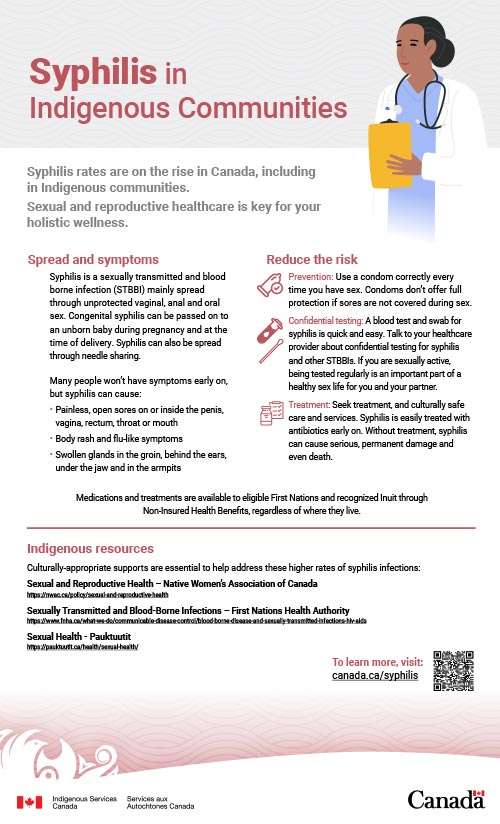Syphilis in Indigenous Communities
On this page
Syphilis in Indigenous Communities: Fact Sheet
Alternate format

Syphilis rates are on the rise in Canada, including in Indigenous communities.
Sexual and reproductive healthcare is key for your holistic wellness.
Spread and symptoms
Syphilis is a sexually transmitted and blood borne infection (STBBI) mainly spread through unprotected vaginal, anal and oral sex. Congenital syphilis can be passed on to an unborn baby during pregnancy and at the time of delivery. Syphilis can also be spread through needle sharing.
Many people won't have symptoms early on, but syphilis can cause:
- Painless, open sores on or inside the penis, vagina, rectum, throat or mouth
- Body rash and flu-like symptoms
- Swollen glands in the groin, behind the ears, under the jaw and in the armpits
Reduce the risk
- Prevention: Use a condom correctly every time you have sex. Condoms don't offer full protection if sores are not covered during sex.
- Confidential testing: A blood test and swab for syphilis is quick and easy. Talk to your healthcare provider about confidential testing for syphilis and other STBBIs. If you are sexually active, being tested regularly is an important part of a healthy sex life for you and your partner.
- Treatment: Seek treatment, and culturally safe care and services. Syphilis is easily treated with antibiotics early on. Without treatment, syphilis can cause serious, permanent damage and even death.
Medications and treatments are available to eligible First Nations and recognized Inuit through Non-Insured Health Benefits, regardless of where they live.
Indigenous resources
Culturally-appropriate supports are essential to help address these higher rates of syphilis infections:
Congenital Syphilis in Indigenous Communities: Poster
Alternate formats

Nurturing and caring for yourself and the next generation helps keep the whole community strong.
Protect yourself and your baby
Congenital syphilis is an infection passed on to an unborn baby during pregnancy or childbirth.
If untreated, congenital syphilis can lead to miscarriage, birth defects and stillbirth. Syphilis can be also transmitted through unprotected vaginal, anal and oral sex.
Syphilis often has no symptoms, but you can develop sores in the mouth, anal and genital areas, a rash, fever, and swollen glands.
Make syphilis testing a part of your regular prenatal care.
Confidential testing and culturally safe treatment
Get tested as soon as possible with a quick and easy blood test and swab, especially if you are pregnant. You might need to be screened again to keep you and your baby healthy.
Treatment for syphilis is safe during pregnancy.
Contact your local healthcare provider to discuss prevention, testing and treatment today.
To learn more, visit: canada.ca/syphilis